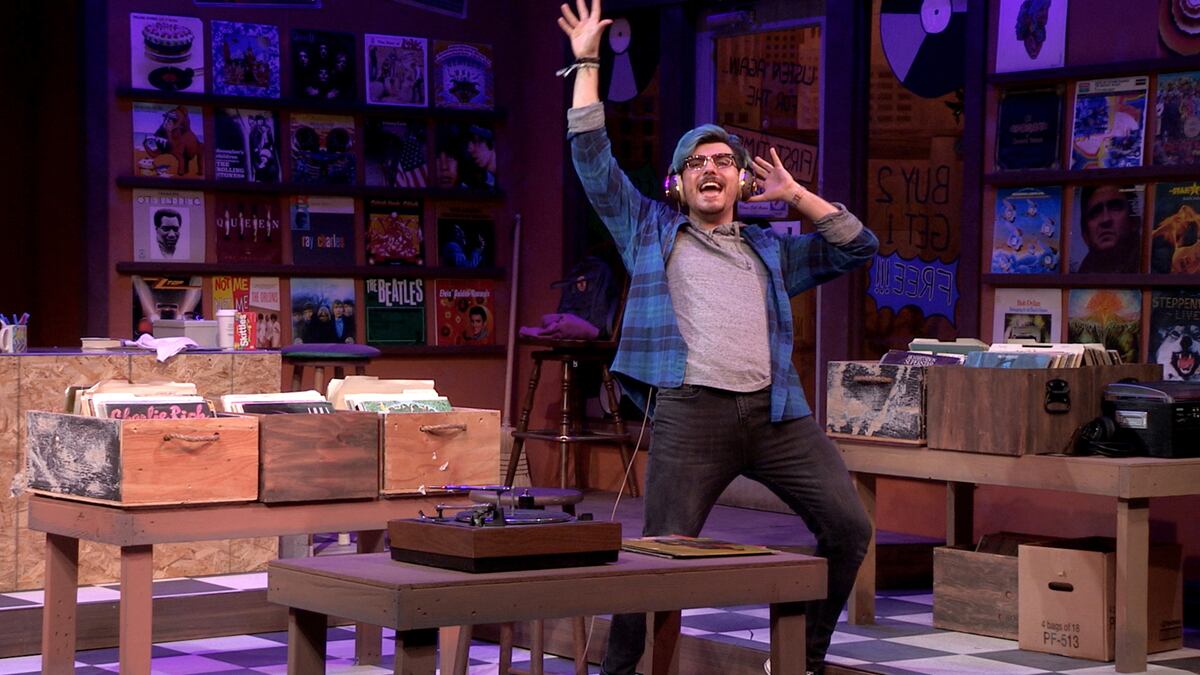Imagine Satan strutting into a musical adaptation of High Fidelity and you’ll start to gauge what Broadway Rose’s Analog & Vinyl is about. The play is technically a supernatural love story, but that barely does it justice. In one hour and 45 minutes, Analog & Vinyl takes on so many intriguing ideas—including nostalgia, toxic masculinity and hell—that it makes you wish it worked better.
The play, directed by Sharon Maroney, unleashes all the typical pleasures of a Broadway Rose production, from slickly gorgeous sets and costumes to actors with enough charisma to send tremors through the company’s massive theater in Tigard. It’s beautiful work, but it is in the service of a subpar script that offers archetypes instead of characters and confusion instead of catharsis.
Alec Cameron Lugo stars as Harrison, a cranky music obsessive who has transformed his father’s 7-Eleven into a record store. The shop is Harrison’s kingdom of good taste—a temple where he can preach the gospel of the Beatles and Brian Wilson while railing against what he sees as the heretical excesses of the digital age.
Harrison works with Amanda (Molly Duddlesten), an unpaid assistant who sings about her blog and practically explodes with joy after watching a video of dachshunds playing with a baked potato on her phone. Her faith in the internet comes across as naïve, but it is more endearing than Harrison’s Luddite cynicism, which stems from both heartfelt belief and forced hipness.
Analog & Vinyl references the romantic comedies of Nora Ephron—who directed Sleepless in Seattle and You’ve Got Mail—which underscores Harrison’s resemblance to a crotchety Tom Hanks and Amanda’s to a buoyant Meg Ryan. Yet the arrival of Satan (Jessica Brandes) disrupts their flirtatious banter, injecting comedic existential dread into a bubbly boy-meets-girl story.
Given the self-conscious weirdness of Analog & Vinyl’s blending of biblical humor and rom-com cliches, the play could have been clever, but not moving. The actors fight to save it from that fate—especially Lugo, who peels away Harrison’s pretensions to reveal the grief and desperation festering beneath.
The peak of Lugo’s performance arrives when Harrison sings an impassioned ode to Nat King Cole and other musical gods. As Harrison clutches a stack of records as if they were a life preserver and then kneels before his beloved collection, you realize that he clings to his passions not only out of love, but out of desperation. There are tragedies in his past, and hearing them explained is never as moving as watching Lugo channel them into his acting.
Analog & Vinyl features songs by Paul Gordon, who wrote the play’s book with Michael Berresse. Their decision to turn Satan into a cheery prankster and matchmaker is delightful, but portrayals of the play’s hero and heroine are oddly unimaginative. Harrison and Amanda rarely deviate from their respective roles as a self-pitying sufferer and a sparkly savior, inhabiting all-too-familiar gender stereotypes that diminish their humanity.
It is difficult to believe in Harrison and Amanda as human beings, but it is even harder to believe in them as a couple. Because of Harrison’s mansplaining, Amanda’s condescension, and the fact that stalking plays a pivotal role in their relationship, they sometimes seem like divorced spouses, not two people on the precipice of romance.
If Analog & Vinyl were a story about characters not meant to be together, the nasty side of Harrison and Amanda’s bond would be less strange. Yet the play wants us to believe that they could be soulmates, which leaves a gaping gulf between who Gordon and Berresse want their unlikely lovers to be and who they actually are.
To watch Analog & Vinyl is to pinball between frustration and delight. For every baffling plot twist, there are several visual flourishes that reaffirm Broadway Rose’s commitment to beautiful theater. It would be easy to write an entire review of Robert Vaughn’s set design or Allison Dawe’s costumes, which include a sparkly pantsuit worn by Satan and a metallic jacket so cool it tempts Amanda to sell her soul.
In the half-dystopian, half-optimistic song “Anything That Matters,” Amanda sings, “Anything that matters can be tweeted or fangirled.” Yet Broadway Rose’s version of Analog & Vinyl is a testament to the belief that art should be big and tangible—a case that the production makes more convincingly than the play.
SEE IT: Analog & Vinyl takes place at the Broadway Rose New Stage, 12859 SW Grant Ave., Tigard, 503-620-5262, broadwayrose.org. Through Aug. 1. $5-$40. You can also stream the show at broadwayrose.org/analog-vinyl. $25.
